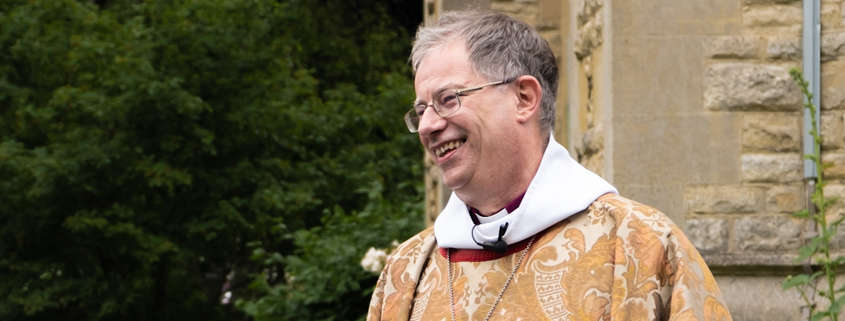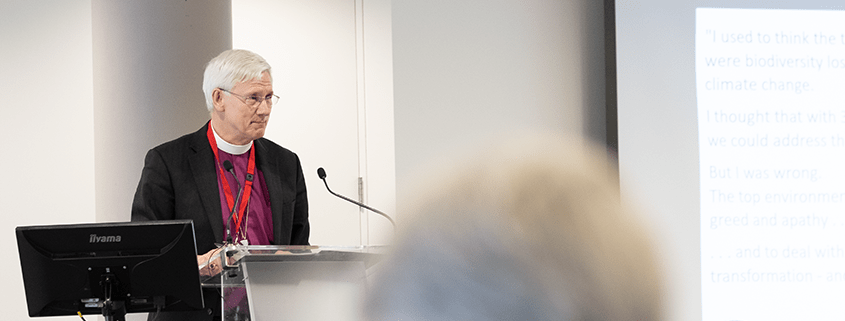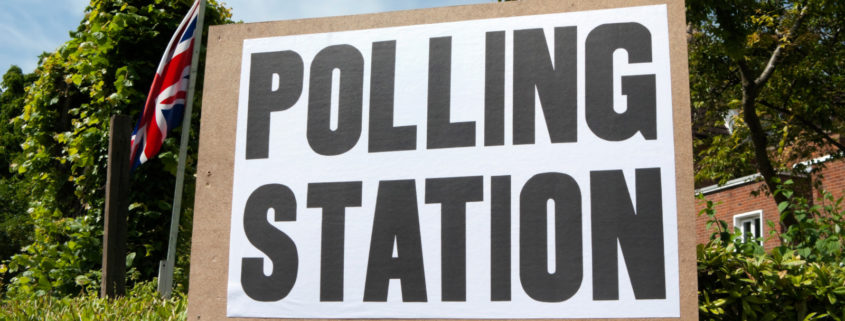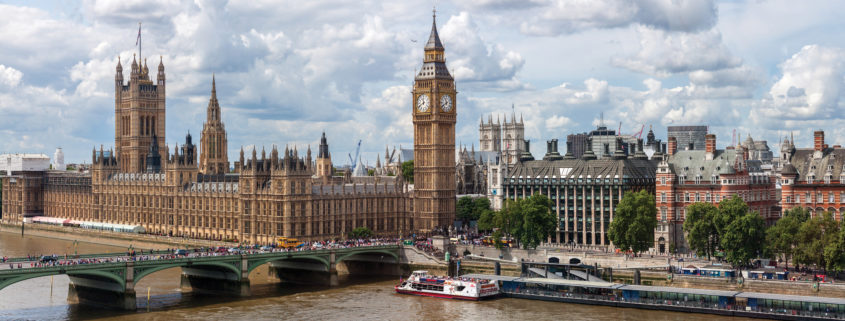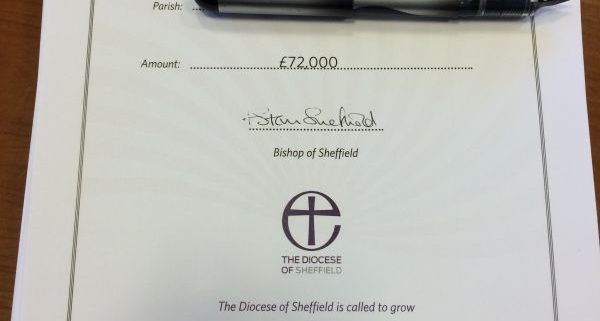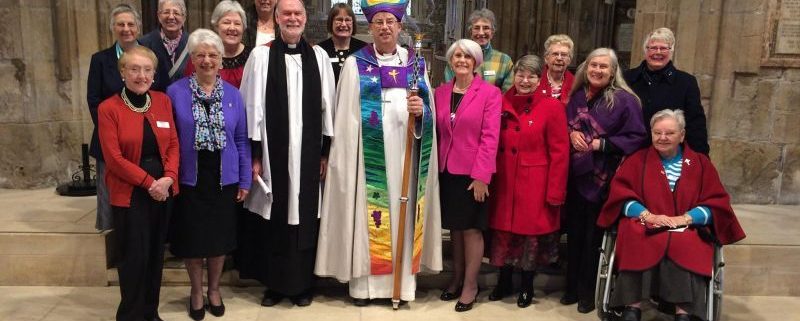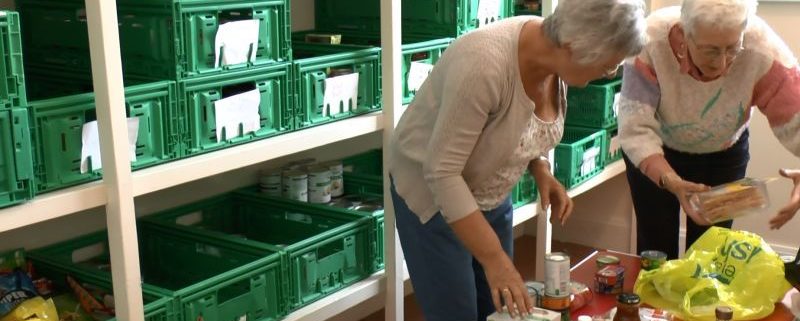A Sermon for the Civic Service of Thanksgiving marking the end of St Mary’s Festival 200.
Posts
Bishop Steven’s address to Diocesan Synod in March 2022, focusing on the atrocities in Ukraine and our call to be a more Christ-like Church.
It was so good to be on road and hedgerow again last week and to begin the new school year with a pilgrimage across the three deaneries of Buckingham, Newport and Milton Keynes.
We covered just under 60 miles with four days of walking and one of cycling along the red routes of Milton Keynes. Along the way, I was able to visit around 30 churches, many of them in small rural communities where the bishop of the diocese doesn’t often come to visit. The churchwarden in one church greeted me warmly by saying that in over 900 years of the life of the parish, I was the first Bishop of Oxford to visit (and what took me so long!).
 A chance to listen
A chance to listen
Lots of people came to walk a stage or two with me, and I think we mustered up to eight cyclists on the middle day. Lots more gathered in the churches – sometimes in twos or threes, sometimes many more, and probably several hundred all together. My thanks to all who came. Despite my chaplain’s firm instruction not to provide hospitality, there was sometimes cake to speed us on our way.
I listened as I walked. It was good to hear how things have been through the months of lockdown and as congregations regather. There were some difficult things, of course, many of them. But on the whole the wardens, licensed lay ministers and clergy I met were determined, hopeful, looking forward and thankful for many blessings received during the pandemic. As in previous years, I chalked a blessing on the doorways:
C+M+B
Christus Mansionem Benidicat
May Christ bless this House
Praying in the (mainly) ancient, quiet, beautiful places of worship was a blessing to me. As in previous years, I took a picture of the font in each church as my own way of remembering the journey and to lift up all of the ministry to children, young people and adults which flows in and out of our baptism.
I was given a fresh appreciation of the importance of rural churches and church buildings and the vital difference just one or two people can make to their life and witness. In the three market towns of Buckingham, Newport Pagnell and Olney, the churches are thriving hubs of life and service reaching out to young people, to refugees, to new families in the area.
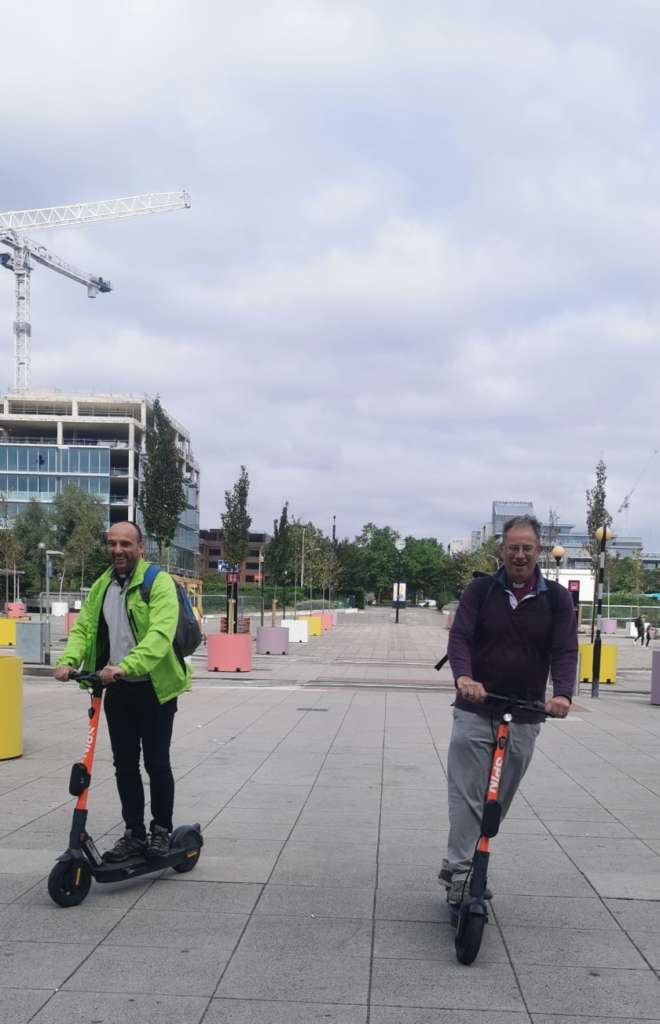
Exploring Milton Keynes
I spent three days of the five focusing on the largest population centre in the diocese – Milton Keynes – and stayed over for two nights to be part of evening meetings as well. I’ve found it hard to get to know MK by driving in and through the city. Walking and cycling was much better. I came away with a renewed sense of the size and complexity of Milton Keynes; the beauty of the woods, waterways and green spaces, and the older villages with their ancient parish churches, which are at the heart of many of the communities.
Parishes in Milton Keynes can be larger than in any other place in the diocese, with 40,000 people and rising. Ministry and church resources are thinly stretched and the population is growing rapidly. It was good to visit the two new church planting hubs in Bletchley and Water Eaton, and a number of other churches planted in recent years as well, to notice areas where it will be important to increase investment in the coming years. There is a deep and moving commitment to ecumenism and it was good to pray and walk with Methodist, Baptist, United Reformed Church and Roman Catholic colleagues.
I had my first close encounter with a starship robot, the automated delivery service which runs across parts of the city, and my first ride on an electric scooter, currently being trialled in the city.
Emerging from the pandemic
And finally there were three special events through the week: a gathering for the churches to reflect on mission together as we emerge from the pandemic, a final service in Christ the Cornerstone with the presidents of the ecumenical partnership, and a powerful evening on the climate crisis, organised by MK Citizens UK with contributions from young people, scientists, the Open University, Network Rail, the Oxford-Cambridge arc and the local authority. It was great to see the climate rising up the agenda of the churches in various ways.
As always, I came away encouraged and refreshed by just dropping in on local churches and inspired by those who minister in them. The pilgrimage begins what will, I hope, be a year of visiting every deanery across the diocese again as we emerge from COVID to listen and to encourage the Church to be the best we can be in this time, for the sake of God’s world.
Thanks to all who took part and to all those who helped to organise the journey.
Bishop Steven
You can see the full photo journal of Bishop Steven’s pilgrimage on his Facebook page.
The Rt Revd Steven Croft, Bishop of Oxford, will be cheering on the England men’s football team in the Euro 2020 tournament.
A Presidential Address to the Oxford Diocesan Synod on Saturday 14 March by the Rt Revd Colin Fletcher, Acting Bishop of Oxford.
One of the great things about being a bishop is that you can re-use material time and again.
I don’t tend to in sermons as I set myself the challenge to write something fresh for every Sunday, and for every licensing, but schools are a different matter. I only have one assembly and I repeat it time and again. What makes it different each time are the wonderful, and not-so-wonderful questions that children ask.
What are the names of your fish?
Which is your favourite football team?
What colours do you wear in church?
How old are you?
How much do you earn?
What’s the best thing about being a bishop? – Answer: People. Endlessly fascinating and glorious
What’s the worst thing? – Answer: People. People falling out with each other. People damaging themselves and, I might add, the Gospel.
But even if the latter threatens to overwhelm at times, it’s the former that pre-dominates.
For this Diocese is a great place to serve in. It’s lively, creative, argumentative, passionate – falling sometimes into the trap of thinking it is more important than it really is, but very rarely dull.
I still pinch myself at times that just over 20 years ago I was invited to come here. Up until that point my parochial experience had almost exclusively been in large evangelical suburban churches with congregations of 400-500 on a Sunday and here I was being invited to become the Area Bishop of the most rural county of the South-East of England. The selection process was equally quirky, consisting as it did of an invitation from Richard Harries to have a glass of wine with him sitting in a deck chair at Linton Road. And if you detect an element of a golden haze hanging over past days you would be right to do so, even if there is so much now in our changed procedures that I warmly applaud. I was one of the lucky ones and there were many that suffered under the former systems.
But I have come to love rural and market town ministry across Oxfordshire with the 326 churches of the Dorchester Area, and the people and priests who serve in and through them.
Over the past 20 years I have, I think, closed, or nearly closed, three church buildings – in Besselsleigh, Daylesford and Highmoor – but we have developed more congregations than that, particularly in our areas of new housing. The buildings themselves, thanks to the outstanding work of churchwardens, treasurers, and others, are in better condition than they have been for decades, if not centuries. What’s more, they are warmer, better used – and many of them have serveries, kitchens and loos.
It is still true that the voluntary sector in the County, and indeed in the Diocese as a whole, would be immensely impoverished if the churches – both our own and those of our ecumenical colleagues, together with the mosques, temples, gurdwaras and synagogues were absent from the Thames Valley. Indeed it has, I believe, been rightly said that one of the most effective ways of increasing our levels of volunteering and partnership working would come through a religious revival.
Just thinking of our own contribution to this rich tapestry I have become more and more convinced down the years of the significance of our commitment to serve the whole community. Legally that is expressed in such things as baptisms, weddings and funerals, and it grieves me when they are dismissed by some as being of little importance. The fact remains that where parishes take those seriously – and by parishes I mean not just the clergy and licensed lay ministers but the whole people of God – then the church grows, sometimes numerically, but always relationally.
For we are a relational organisation and that is both a strength and a weakness. You may, in that context, be aware of what is known as Dunbar’s number – the numbers discerned by Robin Dunbar, the anthropologist and evolutionary psychologist working at Oxford University ‘as the cognitive limit to the number of individuals with whom any one person’ (at any one time) ‘can maintain stable relationships’.
At the upper limit, you and I can probably put a name to a face of 1500 people and have, maybe 500 acquaintances. On the other hand, you may have a close support group of five (who may change even from week to week) or the fifteen you can turn to for sympathy and understanding, or the fifty you might call your close friends.
But in between are the 150 to 200 casual friends – the people you might invite to a large party.
And that number is immensely significant for a relationally-based church. If you have ever wondered why churches in the Church of England grow to that sort of size and then stop there, one answer lies in Dunbar’s number. It does not matter whether the parish is 4,000, or 14,000 or 40,000 it won’t grow to have a bigger congregation than about 150 if people want to relate to each other and to the vicar.
So what can shift that?
Well, we could become non-relational.
But that will not work for Generation Z or many others.
Looking ahead, the diminishing number of clergy means that a reliance on them to turn things around numerically is fool’s gold. If we are to reach out to the many hundreds and thousands moving into this Diocese then we need to pay heed to Dunbar’s number and to work with the grain of it.
And that will mean releasing the whole people of God to celebrate their relationships. It will mean creating structures that are much more fluid and flexible. Messy Churches did not exist when I became a bishop. Today there are just under 4,000 of them in 30 countries across the world. They are largely lay-led and very few of them meet on a Sunday morning.
A few weeks ago I was driving past the former Diocesan Church House on a typical Sunday morning. If you want to know where many of our children and young people are they are out playing rugger in their dozens and hundreds. Churches and congregations are going to have to get a lot more flexible on their timings if we are to reach that generation. We may not like it but Sundays have changed. Other patterns for congregations need developing whether like Trinity at Four in Henley meeting at 4 o’clock on a Sunday or the cross-generational school and church congregation on a Wednesday morning at St Edburg’s Bicester. And what about the fastest growing people group in this country – the over 80s – many of whom will be living in some form of residential or nursing home. How can they be living congregations – some of our 750 new ones – and not just be people having a weekly or monthly service provided for them.
All these are fascinating questions and the log-jam we still need to break as we seek to be more contemplative, more compassionate, and more courageous is to remember Dunbar’s number and numbers – to release the potential of the whole people of God through such things as Cursillo and Personal Discipleship Plans – and never to forget our great strength – and weakness – is in being a church founded on relationships.
There is, of course, nothing new in that, and I close with a quotation from Michael Ramsey’s ‘The Christian Priest Today’ remembering that all of us gathered here are Christ’s Royal Priesthood.
‘Amidst the vast scene of the world’s problems and tragedies you may feel that your own ministry seems so small, so insignificant, so concerned with the trivial. What a tiny difference it can make to the world that you should run a youth club, or preach to a few people in a church, or visit families with seemingly small result. But consider: the glory of Christianity is its claim that small things really matter and that the small company, the very few, the one man, the one woman, the one child are of infinite worth to God. Let that be your inspiration. Consider our Lord himself. In a country where there were movements and causes which excited the allegiance of many – the Pharisees, the Zealots, the Essenes, and others – our Lord gives many hours to one woman of Samaria, one Nicodemus, one Martha, one Mary, one Lazarus, one Simon Peter, for the infinite worth of the one is the key to the Christian understanding of the many.
It is to a ministry like that of our Lord himself that you are called. The Gospel you preach affects the salvation of the world, and you may help your people to influence the world’s problems. But you will never be nearer to Christ than in caring for the one man, the one woman, the one child. His authority will be given to you as you do this, and his joy will be yours as well.’
+Colin
14 March 2020
Bishop Steven is currently on sabbatical.
“God is our refuge and strength
A very present help in trouble.
Therefore we should not fear, though the earth should change
Though the mountains shake in the heart of the sea”
Psalm 46 has a special resonance today… The United Kingdom has voted to leave the European Union. This will be good news for some people but a genuine disappointment to others. The coming years will be marked by uncertainty and change. What does it mean and how should we respond?
A clear outcome
The outcome of the Referendum is clear. 52% of the electorate has voted to leave, 48% to remain. Every English region outside London had a majority to leave.
The vote in the city of Sheffield was close but still 51% in favour. The vote across the rest of the Diocese of Sheffield was even clearer (Doncaster 69% leave; Rotherham 67%; Barnsley 68%; East Riding 60%).
It is a more mixed picture in the Diocese of Oxford (where I become the bishop in a few weeks time). Some local authority areas have clearly voted to remain, others to leave but the balance in the region is still for leaving.
How should we interpret the result?
I watched the television coverage up until 1.30 am and again from 5.30. The politicians were interpreting the outcome in different ways: as a protest against particular parties or politicians, as a comment on the state of the NHS or immigration.
I’m cautious about all of these interpretations. I may be wrong but I believe that such a large number of people voted Leave for two reasons. First they genuinely want Britain to leave the European Union and to assert the right to self determination. 52% of the population in effect set the right to self governance above short and medium term economic prosperity.
Second 52% of the population voted for fundamental change in our country going forward even if that change brings some instability. Those left behind by current economic policies and politics clearly believe they have most to gain from new beginnings. That should tell us something very important.
The ongoing debate
Three vital questions came into focus during the long campaign. The result did not resolve them. We need more reflection and public debate on each.
The first is global migration. We heard again and again that “immigration” was an issue. But for the most part, the campaign was framed in the language the 1970’s and 1980’s. The issue for 2016 is not simply immigration but global migration. We are living through and will live through the greatest migration of people in human history. This movement of peoples is likely to increase through the effects of climate change, population growth, global inequality and armed conflict. We need a comprehensive, deep conversation about how Britain and the world will respond.
The second is identity. What does it mean to be British in 2016? We need leaders of vision able to articulate an inspiring vision for Britain and its future. That positive vision did not emerge in the campaign from either side.
The third is a new kind of politics. The murder of Jo Cox MP was an immense tragedy. The response of politicians on all sides helped us see again how many good, honest people represent us in Parliament. We need a style of public discourse which is more honest, more humble, more gentle and more kind. This will take more than self-discipline on the part of those in public life. We need some new symbolism. Over the next ten years, the House of Parliament are to be refurbished. Will we have the courage, I wonder, to reshape the chamber of the House of Commons to be less adversarial, less binary, more collaborative, seeking wisdom from every part of the community?
How should the Church respond?
The Archbishops of Canterbury and York have issued a statement this morning calling for humility and courage. They say “Unity, hope and gentleness will enable us to overcome the period of transition that will now happen and emerge confident and successful”.
The Church will respond with prayer for our government and Parliament and for all sections of our society. We will respond by entering into hopeful dialogue with people on all sides of the debate with courtesy and kindness. We will respond by cherishing the poor and the vulnerable and renewing our efforts to build a safe, just and peaceful world. We will continue to welcome the stranger and show mercy to the needy here and around the world. We will continue to build bridges and bonds of friendship across Europe and across the whole world.
In the words of Psalm 46, we will not be afraid though our world may be shaken. We will take time today to pray, to think, to love and to speak gently in God’s name.
+Steven
“Even though I walk through the darkest valley, I fear no evil; for you are with me”
These words from Psalm 23 have been in my mind this week following the atrocities in Orlando and the terrible murder of Jo Cox yesterday.
I’ve been in Parliament for my final week of duty there as the Bishop of Sheffield. It’s been a sombre week. The House of Lords kept a minute’s silence on Monday afternoon before prayers for the victims of the Orlando shootings. On Monday evening I walked through Soho on the way to meet my son. I was moved by the powerful display of solidarity by the LGBTI community there and across the world.
On Tuesday morning I attended the National Parliamentary Prayer Breakfast in Westminster Hall with around 750 guests including 150 members of both Houses of Parliament. Again we kept silence and prayed for the victims of Orlando. The address by Bishop Angelaos of the Coptic Church was on the suffering of Christians throughout the Middle East.
On Wednesday I took part in a debate in the House of Lords on the European Union’s response to the global migration crisis and particularly, the role of Operation Sophia, the mission to disrupt people smuggling from North Africa to the coast of Italy. There were powerful and compassionate speeches but, of course, no easy answers.
So it had already been a week of difficult news by Thursday when I heard first that Jo Cox MP had been attacked in Birstall and then, when I arrived home, that she had died from her injuries. There has been a public outpouring of prayers and vigils for Jo and for her family and friends.
The tributes have been very moving and Jo will clearly be greatly missed. We do not yet know or understand the reason for the murder. It is hardest to bear for her family of course, but hard as well for all Members of Parliament on every side of the House of Commons. As has been said, the ordinary work of MP’s in meeting their constituents every week is seldom newsworthy but it is the very core of our democracy and a vital part of British life. I join with those who have called for appreciation and thanks to be extended to those who represent us.
This has been a week for reflection on a series of tragedies. In each of these, and all the others, I draw comfort from the words of Psalm 23:
“Even though I walk through the darkest valley, I fear no evil, for you are with me; your rod and your staff they comfort me”.
God is with us even in the depths and the darkest places and God is with those who suffer, in part through all of us extending our love and care and support to those who are hurting most.
We remember God’s love and we pray for those who mourn, for the injured, for the persecuted, for those in danger on land and sea.
But we must also be stirred by these events to engage afresh with the great challenges of our age: to work towards a world which is safe, secure and just for all peoples irrespective of sexual orientation or faith or ethnicity or the place in the world where you are born.
I am struck again at the end of this week by one of the prayers from the funeral service. In the face of such suffering it is vital for all of us to live our lives with purpose and with meaning:
Grant us Lord, the wisdom and the grace to use aright the time that is left to us here on earth. Lead us to repent of our sins, the evil we have done and the good we have not done; and strengthen us to follow the steps of your Son in the way that leads to the fullness of eternal life; through Jesus Christ our Lord. Amen.
I spent an hour or so yesterday signing around 200 certificates to be sent to churches across the Diocese of Sheffield to say thank you for the contributions to Common Fund, our shared Diocesan budget. This is something I do every year. I find it a very moving exercise. 
The certificates are normally displayed in the Church porch or elsewhere on a noticeboard. I also write a letter to the Vicar and the PCC. Each one says thank you on behalf of the Diocese, but also on behalf of other churches across the Diocese for generous sacrificial giving.
The Diocese of Sheffield serves an area which is one of the poorest in the country in economic terms. However, for many years, the Diocese of Sheffield has been one of the most generous in the country in terms of the proportion of people’s income which is given away to and through the local church.
Last year the churches of the Diocese gave £4.5 million to the Common Fund, our Diocesan budget. Each certificate I signed yesterday represents a double act of generosity and adventurous giving.
First it represents thousands and thousands of individual decisions by individuals and families to give generously and sacrificially to the life of the local church to sustain ministry in that place.
Second it represents hundreds of decisions by Church Councils to prioritise generous, adventurous giving to the Diocese in their own budgets. For that reason, I try and sign the certificates slowly, giving thanks for all that they represent.
If you are part of this adventurous, generous giving in any way then thank you. Common Fund is the cornerstone of our Diocesan budget. It enables us to support Christian ministry and mission in every part of this Diocese, especially in communities which would find it difficult, if not impossible, to support a priest. Generous giving to the Common Fund enables us to grow ministry in all kinds of ways and that enables us, by the grace of God, to grow the life of the Church and to make a bigger difference in the communities we serve.
Long ago, St. Paul reflected on the generosity of the churches of Macedonia. You can read his words in 2 Corinthians 8 and 9. Paul is moved by their gracious giving:
“For I can testify that they voluntarily gave according to their means and even beyond their means, begging us earnestly for the privilege of sharing in this ministry to the saints – and this not merely as we expected; they gave themselves first to the Lord and, by the will of God, to us” (8.3-5).
According to Paul, this generous act of giving flows directly from our faith and from the example of Jesus Christ:
“For you know the generous act of our Lord Jesus Christ, that though he was rich, yet for your sakes he became poor, so that by his poverty you might become rich” (8.9).
Paul urges many others, including the Church in Corinth, to follow the example of the Macedonian Christians and of Christ himself and give themselves to the Lord:
“One who sows sparingly will also reap sparingly, and the one who sows bountifully will also reap bountifully. Each of you must give as you have made up your mind, not reluctantly or under compulsion, for God loves a cheerful giver. And God is able to provide you with every blessing in abundance, so that by always having enough of everything, you may share abundantly in every good work.” (9.6-8)
It is an extraordinary miracle of faith and generosity that God’s people in this place give in this adventurous way. Together through our giving we have a share in all of the ministry and mission which is taking place across this Diocese. Together we make that ministry and mission possible.
Thank you for your part in that and please persevere. The challenge continues from year to year and there is always more that we can do. If you are not yourself involved in this adventure of grace then there is plenty of room for more people to join in.
Together God has called us to grow a sustainable network of Christ like, lively and diverse Christian communities across this Diocese, effective in making disciples and in transforming our society and God’s world.
Week by week, month by month, year by year, we see that vision becoming more of a reality. Thanks be to God and to all God’s generous people.
+Steven
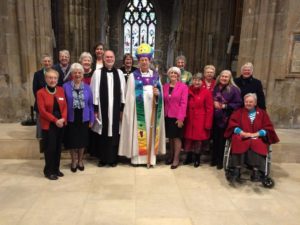 This morning I commissioned the new President of the Mothers’ Union in the Diocese of Sheffield, Pauline Reynolds (on my left in this photo with the rest of her team). This is the sermon I preached at the service. I focussed on the second of the Mothers’ Union’s five objectives and asked every branch and every member to reflect on what I said in the coming months. The Bible readings were the story of Samuel’s call from 1 Samuel 3 and Jesus’ meeting with Mary and Martha in Luke 10.
This morning I commissioned the new President of the Mothers’ Union in the Diocese of Sheffield, Pauline Reynolds (on my left in this photo with the rest of her team). This is the sermon I preached at the service. I focussed on the second of the Mothers’ Union’s five objectives and asked every branch and every member to reflect on what I said in the coming months. The Bible readings were the story of Samuel’s call from 1 Samuel 3 and Jesus’ meeting with Mary and Martha in Luke 10.
“One of my favourite television programmes as a child was Mission Impossible. I continued to like the more recent series of films. I love especially the part at the beginning where the team are given their clear but difficult task. The message always contains the words: “Your mission if you choose to accept it”. It always ends with “This tape will self destruct in five seconds”.
It is very good to be here with you in the Cathedral today for this special service. I would offer my sincere thanks to Sheila Wood for her leadership of the Mothers’ Union in this Diocese over the last three years. I am thankful for the gifts Pauline Reynolds will bring to this role and assure her of my prayers and support as she takes up this office today. My thanks also to the outgoing team and to the new team who will be commissioned later in this service.
And my thanks and appreciation to the Mothers’ Union for all that you do across the Diocese to serve others and to fulfill your objectives.
In the light of the readings you have chosen, I want to say two things to Pauline and to all of you as you look ahead over the next three years.
The first one can be said quite briefly, but I think it’s important. Don’t worry about your membership numbers and recruitment to the Mothers’ Union.
I say that not because Pauline is particularly concerned about this but because the Mothers’ Union generally, in my experience, can be more concerned about numbers and recruitment than about fulfilling its objectives. This is understandable. But I believe it is mistaken.
A smaller, active Mothers’ Union working towards the five objectives is worth more in a parish or in a deanery or in a diocese than a large Mothers’ Union which has a lot of people at meetings but does very little. A Mothers’ Union which is outwardly focussed and working on these five objectives together will attract far more of the right kind of members than a Mothers’ Union which exists simply to hold monthly meetings. A Mothers’ Union which is outwardly focussed and working on these five objectives together may not need to hold many meetings at all. The meetings they did hold would be focussed very tightly on these aims. But they may do a power of good in all kinds of ways.
So what are your objectives? What is your reason for existing? In different language what is your mission?
Your five objectives are listed on the inside back page of the service booklet. They are clear and vitally important for Church and society and for many individuals within it. They should be the reason people join the Mothers’ Union and the reason people hold office within it. Perhaps I should have arranged for the Mission Impossible theme tune to play at this point in the sermon.
You are committing yourselves today:
• To promote and support married life
• To encourage parents in their role to develop the faith of their children
• To maintain a worldwide fellowship of Christians united in prayer, worship and service
• To promote conditions in society favourable to a stable family life and the protection of children and
• To help those whose family life has met with adversity.
This is your mission if you choose to accept it.
I hope these five objectives are read regularly at Branch meetings and Committee Meetings and special events. I hope they shape your work. If it would be helpful, I would gladly spend some time working through all of these objectives with you as part of my own support for what you do.
Don’t worry about how many members you have. Read the story of Gideon’s army. A small committed group will always accomplish more than a large group that does not know what it is for. Focus instead on your unique mission – as you do that I believe the right people will want to join you.
Second let me say something to you at the beginning of this triennium and to your new President about the vital importance of the second of your objectives: your mission, if you choose to accept it, is to encourage parents in their role to develop the faith of their children.
There is no greater gift that we can give the children in our families, in our churches, in our schools, in our wider society than the gift of faith. The whole course of a child’s life will be affected by developing faith in childhood. What an immense gift it is to know that you are loved by God, the maker of the universe; to know that you are called to a lifelong friendship with your creator; to know that you are part of a worldwide family; to understand the great gift of prayer; to receive God’s guidance at life’s great crossroads; to develop Christian character; to become all that you are meant to be. All of these gifts and more are given through the development of faith in children. Lives are saved, deepened and enriched, families are transformed and the world is changed.
Samuel is nurtured in faith as a child through his mother Hannah who prays for him and prays with him. He is nurtured in faith as a child through Eli who instructs him in prayer and in listening to God’s voice. Samuel will go on to lead Israel and change his nation. But the foundations of his life and his friendship with God are laid in childhood.
Mary and Martha grow up in a home where they learn both to work and to pray. They are sisters. The foundations of their love for God have been laid in childhood and laid in the home. It is true that for one, Mary, prayer becomes her focus and for another, Martha, action takes priority. We know from the story that Mary has chosen the better part. But prayer and action both are needed. Our strength is born in God. Our faith is lived out through what we do.
Why do I focus on this objective today? Sadly, because your work here is urgently needed. The evidence is that Christian parents today are not developing the faith of their children.
These statistics were in research published last year . Anglican parents who say that religion is very important in their lives were asked these questions.
Is it important that children learn good manners at home?
94% said yes.
Is it important that children learn tolerance and respect at home?
83% said yes.
Is it important that children learn religious faith at home?
How many do you think said yes?
36%.
Let that sink in a little. Only one in three committed Anglicans believes that Christian parents should develop the faith of their children. As a Mothers’ Union that should disturb you as it disturbs me. I wonder what we might do about it?
Let me offer four things that you can do and can encourage yourself.
The first is to become more like Mary and Samuel. Set as a priority the developing of your own relationship with God, to listen, to be sustained, to draw apart often. A relationship with God is caught, not taught. It can only be taught from someone who is growing in that life of prayer themself. Set aside time each day to pray, discover how if you do not know how, go deeper into God. Weave that prayer into daily life, especially the saying of grace at meals.
The second is to teach the faith within your own family, to your children and to your grandchildren. Every Mothers’ Union member at least should be seeking to develop faith within their own children, grandchildren, nephews, nieces, members of our extended families. We do that through our prayers, through conversation, through encouraging the parents, through providing gifts and resources, by inviting children into the family and fellowship of the church in different ways.
The third is to campaign together to ensure that every church which has a Mothers’ Union branch is friendly and accessible to children and families. I want you to be my allies here – God’s secret agents in support of parents and their children. I want to enlist your support in ensuring that every church which has a Mothers’ Union branch also has crèche facilities, a toddler group, a place where children learn on Sundays, family events at festivals, groups for young people, Messy Church, people who will befriend young families.
And the fourth is to campaign together to ensure that every church which has a Mothers’ Union branch is also teaching faith to the parents so that they can develop faith in their own children. The number one reason, I think, why parents do not pass on their faith to their children is very simple. The parents themselves don’t have the confidence to do so. They have not been taught. Will you work with me to ensure that in every church where you have a Mothers’ Union branch, there is an opportunity every year for adults to learn the faith from the very beginning .
Here are four things you can do to fulfill your second objective: to encourage parents in their role to develop the faith of their children.
1. Deepen your own faith
2. Develop faith within your own family
3. Ensure every church is friendly and accessible to children and young people
4. Ensure every church is teaching the faith to adults
I will provide Pauline with a copy of this sermon. I would like you to discuss it at your next branch meeting and decide what you need to do to fulfill this objective in the coming year.
The Mothers’ Union has a vital mission. Focus on what God has called you to do. May God bless you in all your service in the coming years”.
Lent begins tomorrow. It’s the time of year when Christians give something up – usually food – or else take something on for the sake of others.
Let me tell you a true story for the beginning of Lent about kindness and practical help.
Sohail Mumtaz is a leader of the Muslim Community Association in Sheffield. Last year, during Ramadan, he challenged one of his friends, Lee Ward, to have a one day fast.
Lee fasted and the experience of going hungry for a day made him think of the children in his community who are hungry. These are the people who are regularly helped by the S2 Foodbank. The Muslim Community Association and the churches both provide food and funding for distribution.
Lee and Sohail are taxi drivers. They wanted to do something more to help the children of their community. They approached other taxi drivers across the city. Together they raised the money and gave the time to take 96 parents and children to Cleethorpes for a day at the seaside in September. Many had never been to the coast, and most had never had a holiday
Deni Ennals, the Foodbank co-ordinator, organized the trip. Friends and neighbours donated car seats for children, buckets and spades, sun hats, lotion, items for the picnic and cash for fish and chips. Every family was given some spending money for donkey rides and the fairgrounds. Everything went without a hitch. The day was a huge success.
Deni wrote afterwards to say thank you to the foodbank supporters: “This one day away from the drudge and poverty of their normal lives did more for many of our clients than any antidepressant many have been prescribed. It’s a shame we could not bottle the fun and laughter and bring it home to help them through the winter months, when many will not only experience food poverty but also fuel poverty, where homes will have no heating and cooking facilities will become a luxury”.
As far as we know, there are 50-60 Food Banks across South Yorkshire and the Diocese of Sheffield. It would be excellent if none of them were needed but all of them are. Most of them are connected to churches and to other faith communities who supply volunteers and donations of food. A wide range of community groups support them.
Most clients don’t use the food banks regularly but a very wide range of people have to use them from time to time. Recent research on provision in the Diocese can be accessed in the Feeding Britain Sheffield Diocese Report. The findings link to the All Parliamentary Group on Hunger’s Feeding Britain Report which can be found here.
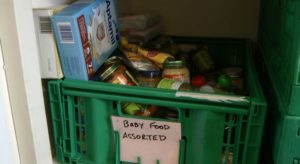 Why do people need food banks in modern Britain? We have food in abundance – enough to waste in most of our homes. There are many different reasons but top of the list in every survey are delays or errors in paying benefits, problems with disability benefits, or the application of benefit sanctions (where payment of a benefit is delayed or stopped because a claimant has not met certain conditions). People may be out of work, or they may be in very low paid jobs. Most commonly, people use food banks when there is some unforeseen crisis in their lives.
Why do people need food banks in modern Britain? We have food in abundance – enough to waste in most of our homes. There are many different reasons but top of the list in every survey are delays or errors in paying benefits, problems with disability benefits, or the application of benefit sanctions (where payment of a benefit is delayed or stopped because a claimant has not met certain conditions). People may be out of work, or they may be in very low paid jobs. Most commonly, people use food banks when there is some unforeseen crisis in their lives.
It is important to understand that something can be done about most of these reasons. Next week the General Synod will debate the impact of benefit sanctions. The Diocese of West Yorkshire and the Dales have brought a motion to debate. Malcolm Chamberlain, Archdeacon of Sheffield and Rotherham, will put a “friendly” amendment to the motion on behalf of this Diocese to strengthen its impact, calling on the government “to initiate a full independent review of the impact and efficacy of the sanctions and conditionality regime”. The background papers for the Synod debate are GS 2019A Impact of Sanctions on Benefits Claimants and GS 2019B .
But back to Lent and giving something up. How can we help, today? All Christians at this time of year are encouraged to fast in some way and offer practical support and help to those around us.
- Foodbanks across the Diocese are looking for support and help: volunteers, supplies, practical aid of all kinds. It may be that your own local church is already supporting a foodbank. If it’s not, can you connect with one?
- Foodbanks are even more effective when they build community, treat people with respect and help and support them in other ways. The Sheffield taxi drivers are an example to us all. What can you and I do to help?
- Recent research suggests that foodbanks help more people when they make advice available within the foodbank on benefits, on money management, on debt. This already happens in some foodbanks in Sheffield (including S2) but needs to spread to more.
- Food waste is a massive scandal in modern Britain. What can we do to reduce the amount of edible food we throw away? If you’ve not seen it yet, I can recommend the excellent documentary by Hugh Fearnley Whittingstall, “Hugh’s War on Waste”
- Foodbanks are needed because there are holes in the net of welfare provision. It’s important for churches and others to lobby government to mend the nets so that no-one, and especially no child, goes hungry. There is more on that in this report from the Church Action on Poverty http://www.church-poverty.org.uk/safetynet
Lent is a time to pause, to slow down, to reflect on our lives, to connect more deeply with God and with our neighbours. As you give something up this year, take time to help others who do not have enough.
+Steven

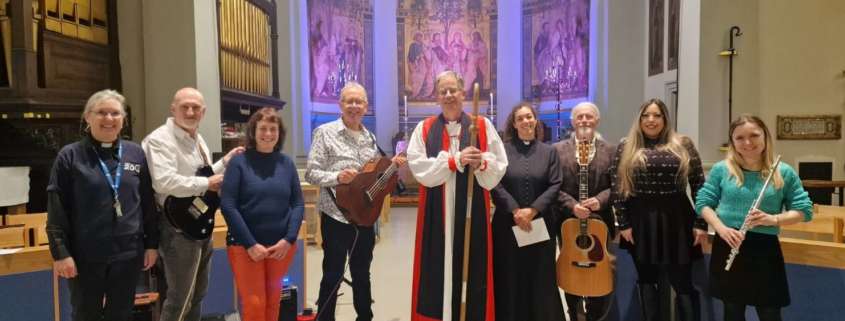

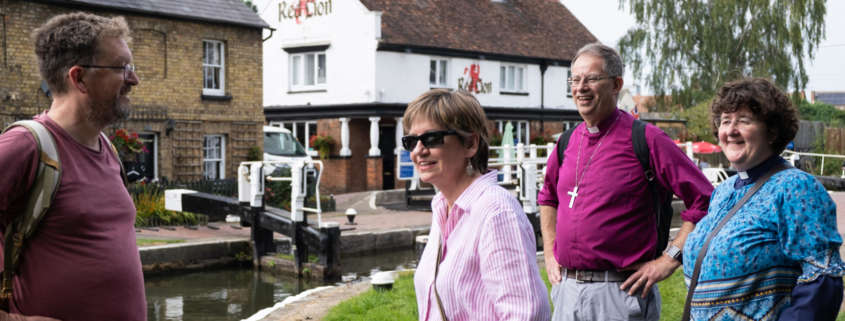
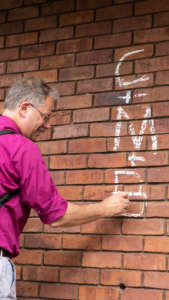 A chance to listen
A chance to listen